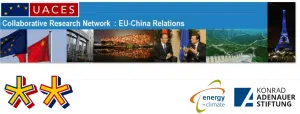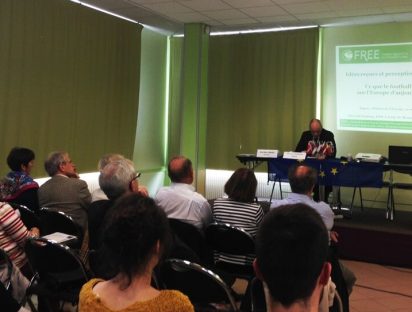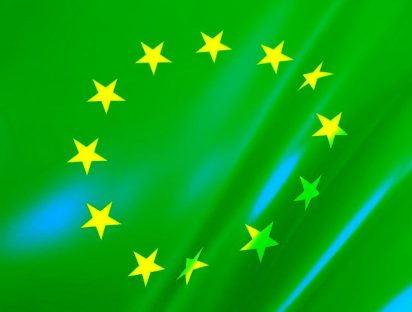CALL FOR PAPERS 8th Workshop on EU-China Relations in Global Politics ‘Coping with Disruption:Dimensions of Digitalisation in Europe and Asia’ Singapore, 14–15 March 2019
Download the complete Call for Papers here.
Download the complete information brochure here: 8th-EU-China-Workshop-Singapore-Brochure
Digitalisation of Energy and Resource Systems
The process of digitalisation encompasses almost every aspect of our modern society. Digitalisation presents Europe and Asia with a variety of challenges and opportunities that need careful consideration and sophisticated governance. Leveraging innovation to harness better economic returns paired with more sustainable management of the world’s resources is of utmost importance in an age of rapid climate change. Digitalisation and data-driven insights can help address the plethora of those challenges.
Digital Governance & Smart City Management
Digital governance and smart city management promise better services to urban citizens. The European Union (EU) provides financing in the Horizon 2020 framework to identify smart cities and communities that pilot innovative solutions. The GrowSmarter initiative, for example, showcases low energy districts, integrated infrastructures, and sustainable urban mobility in Stockholm, Cologne and Barcelona. In China, Alibaba’s Cloud services suggest a City Brain solution helps manage Hangzhou’s traffic increasing average travel speed by up to 15% and shortening the emergency vehicle response time by 50%. In Songdo, South Korea is experimenting with integrated waste management systems on the scale of an entire city.
Digitalisation of Financial Markets and Investment
Traditional financial institutions experience difficulties in adapting their services to this rapid change, while innovative business models of FinTech start-ups such as N26 or Wirecard capture market share by reducing costs and offering more convenient services. Tech giants such as Tencent seek to internationalise their mPayments solutions and start offering banking services in their home market. At the same time crypto-currencies, blockchain technology, and distributed ledgers promise higher security and more efficient capital allocation potentially revolutionising insurance models as well.
Digital Manufacturing Strategies and the Internet of Things
In terms of manufacturing, the Industrial Internet of Things (IIOT) will lead big data and automation around the globe. According to PwC, the compounded investment in IIoT will amount to 6 trillion USD compounded over the years 2015 to 2020. Germany’s Industry 4.0, Made in China 2025 and the US’ Advanced Manufacturing Partnership are competing for the prime spot. According to The Economist and the International Federation of Robotics, only 0,7% of industrial workers are robots. Fundamental shifts in manufacturing automation are on the horizon. The automotive sector and the electronics industry are leading the charge of total annual robot sales with 38% and 25% respectively, but other sectors, such as construction, hold promising perspectives as well.
What are the geopolitical and geo-economic implications of the rapid digitalisation in Europe and Asia? What are the efficiency gains in energy infrastructures, green transformation and sustainable resource management? How can data-driven insights be translated into better governance and management? How can digitalisation facilitate connectivity in Eurasia? How will financial institutions wither the digitalisation and what are the implications for cybersecurity, data protection and intellectual property rights in Europe and Asia? What are the preconditions for businesses and civil society to harness the power of data while striving for a more sustainable and human-centred future?
The event takes place in the framework of the UACES Collaborative Research Network on EU-China Relations (ESSCA School of Management at Angers / College of Europe at Bruges / Technical University Munich*). The event is generously supported by Konrad-Adenauer-Stiftung, Regional Project Energy Security and Climate Change AsiaPacific (RECAP), based in Hong Kong SAR.
Submissions
We invite applications by both senior and junior scholars, researchers, graduate students, practitioners and representatives of the private sector and the civil society of all nationalities to send us their paper proposals or case studies on the following themes:
1. Digitalisation of Energy and Resource Systems
2. Digital Governance & Smart City Management
3. Digitalisation of Financial Markets and Investment
4. Digital Manufacturing Strategies and the Internet of Things
Proposals should not exceed 500 words. Deadline for submission is Fri, 15 February 2019. Accepted panellists will be informed on a rolling admissions basis. The full-fledged papers of 5000-8000 words or case studies will be expected by Fri, 1 March 2018.
Please submit your proposal along with your short biography in the submission form online.
Financing
Participants are expected to cover their travel expenses to Singapore. Accommodation and conference expenses will be fully covered. Senior participants receive individual hotel accommodation. Junior participants receive hotel accommodation in pairs of two.
Scientific Committee
- Dr Frauke AUSTERMANN, Research Associate of the ESSCA EU*Asia Institute
- Dr Peter HEFELE, Director of the Regional Project “Energy Security and Climate Change” at Konrad-Adenauer-Stiftung, Hong Kong
- Prof. Dr MEN Jing, InBev-Baillet-Latour Chair of EU-China Relations at College of Europe
- Prof. Dr SHEN Wei, Associate Dean for International Relations at Deakin University & Jean Monnet Chair in EU-China Relations at ESSCA School of ManagementDr Jean-François LEMOINE, Director of the Doctoral School of Management Panthéon-Sorbonne (EDMPS) and head of the Digital Organization Research Group of the ESSCA School of Management
Dr Paul NATHAN, Director of the Institute of Digital Marketing at ESSCA School of Management
For more information, please visit our conference website or e-mail assistant-shanghai@essca.fr.
Hosting institutions: EU-China Collaborative Research Network:






